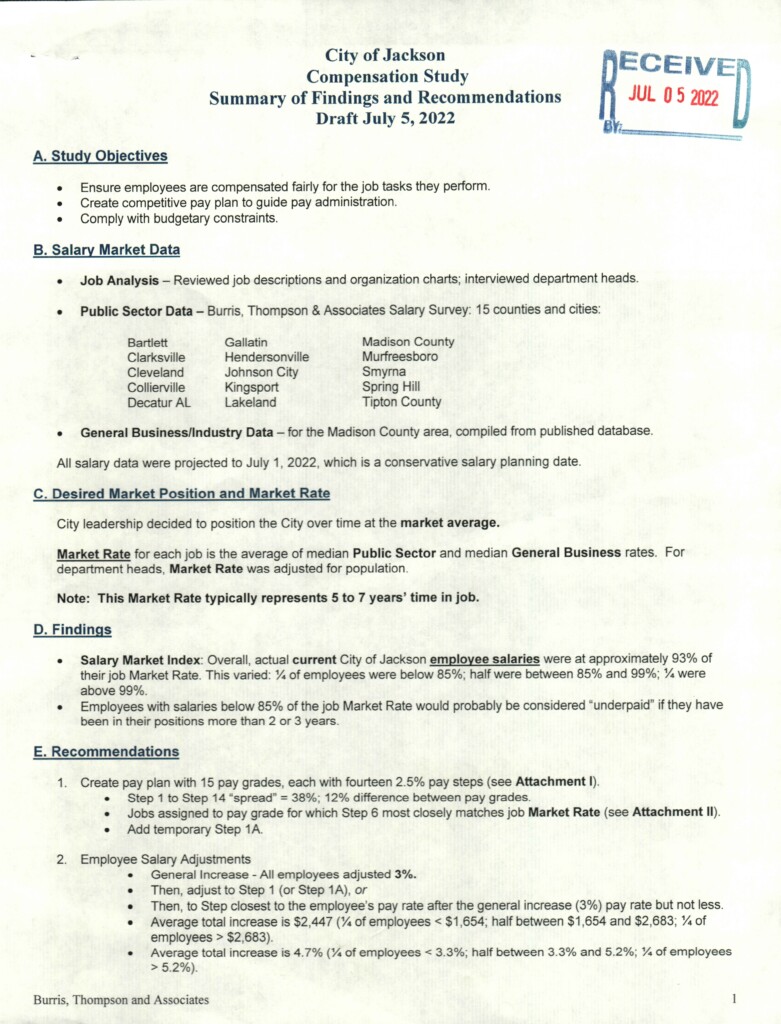UPDATED: Study provides insight on potential salary increases for city employees
JACKSON, Tenn.—In our continuing coverage regarding the budget, we have additional information, including the Compensation Study.
Attached is the Compensation Study. Please notice in Section A, the third bullet point – Comply with budgetary constraints. It appears the City is only considering the first two points and has ignored the third one.
Section B, Market Data – Several Cities used in the comparison are out of scope to be relevant. Some are either much larger metropolitan areas, which would generally pay more than smaller cities like Jackson. Several of the Cities have a much higher average income for residents and higher property values – Clarksville, Hendersonville, Murfreesboro, Smyrna, Spring Hill, etc.. Their choice for the Counties they selected is odd. Tipton County is relatively small, and the largest portion of Madison Co. is the City of Jackson. Also note, there are cities included in this comparison that are also responsible for the local school district (which is expensive) where Jackson is not.
The study says ‘Overall employees were at almost 93% of their job market rate’, which could be questioned who set this rate? Is it based on revenue or an ‘ideal’ number that doesn’t reflect actual individual market dynamics? How many citizens and taxpayers are at 93% of their job market rate? From the discussion surrounding the absolute need to make massive increases in salaries and benefits, shouldn’t the study have shown much worse than most employees within the 93% range? Whose target is 100%, based on a number that should be set by market dynamics in each category and what the area as a whole is paying its citizens. If City Employees should be at these arbitrary 100% numbers, what does that say to the citizens in Jackson who are paid less than 100% of the so called market rate? If you are using this scale, then no one should be paid higher than 100%, but you are proposing to do just that for certain individuals.
The study says the annual cost would be $1,722,504 but clearly that number is inaccurate or does not reflect the total number of people getting an increase and/or the size of their proposed increase(s). What is the total increase in salary cost for FY 25?
The study does say the adjustments could be phased in over 12 to 24 months, wouldn’t 24 months be more appropriate and easier to manage from a budget standpoint? Why is it absolutely necessary to do all the increases within one fiscal year?
The costs for the increases excludes the costs of benefits which are directly tied to any increase in salary. What is the increase in costs for benefits for FY 25?
One of the most glaring issues with this study is that it does not properly measure what people actually receive from their job. If you are to do accurate and fair comparisons, you have to combine a person’s salary with their benefits. It is the total compensation that is the bar to measure how people are actually paid, since benefits are included within the cost of personnel. At the current time City Employees have better benefits than the average worker within the private sector. City Employees have more time off (holidays, vacation time, etc.) and the cost they pay for comparable if not much better benefits than non-City Employees is considerably less. In many cases their retirement plan is also far superior to those in the private sector and also should be factored in as part of their total compensation. It appears to be another case of apples and oranges when you are putting these numbers together. There are people in the private sector that are paying over $200 (or higher) a month for basic insurance. Many of them do not have any type of retirement, unless they are funding their own 401k.
If you add in the dollars the City spends for its employees benefits (including health care and retirement), you would see the level of compensation change to a much higher than most of them being at 93% (of some arbitrary number). Every dollar a City Employee does not have to spend for any type of benefit, is directly tied to the overall money they will take home at the end of the day. If they save $200, $300, $400 or more in what they don’t have to pay for benefits like their peers in the private sector, then it is relevant to include that in what they make working for the city.
It appears when you pull the curtain back on this study, you don’t have to be a financial wizard to see these numbers do not accurately or appropriately reflect what the City is paying its employees. The FY25 budget does not only propose the largest single year increase in salaries, but also the largest single year increase in benefits. When you talk about decent wages or balancing the budget on the backs of City Employees, those terms are far out of the scope of reality when you factor in total compensation. To balance the budget on the backs of City Employees would be not to give them any raises and/or to cut staff to ensure the budget is balanced. City Employees have consistently received annual salary increases and some areas, like Patrol Officers that are difficult to fill, have received exceptional increases. No one has suggested City Employees not receive a raise. It’s the substantial increases that are impacting the budget in a very significant way that should be closely examined and questioned. It is inconceivable to be told that within an almost $99 million budget there are no places that could be cut, trimmed, reduced or expenses postponed. No one is undervaluing City Employees, but at the same time it appears the primary people the City is responsible to serve, the Citizens of Jackson, are far less important. Isn’t that the opposite of what it should be, with the Citizens coming first?
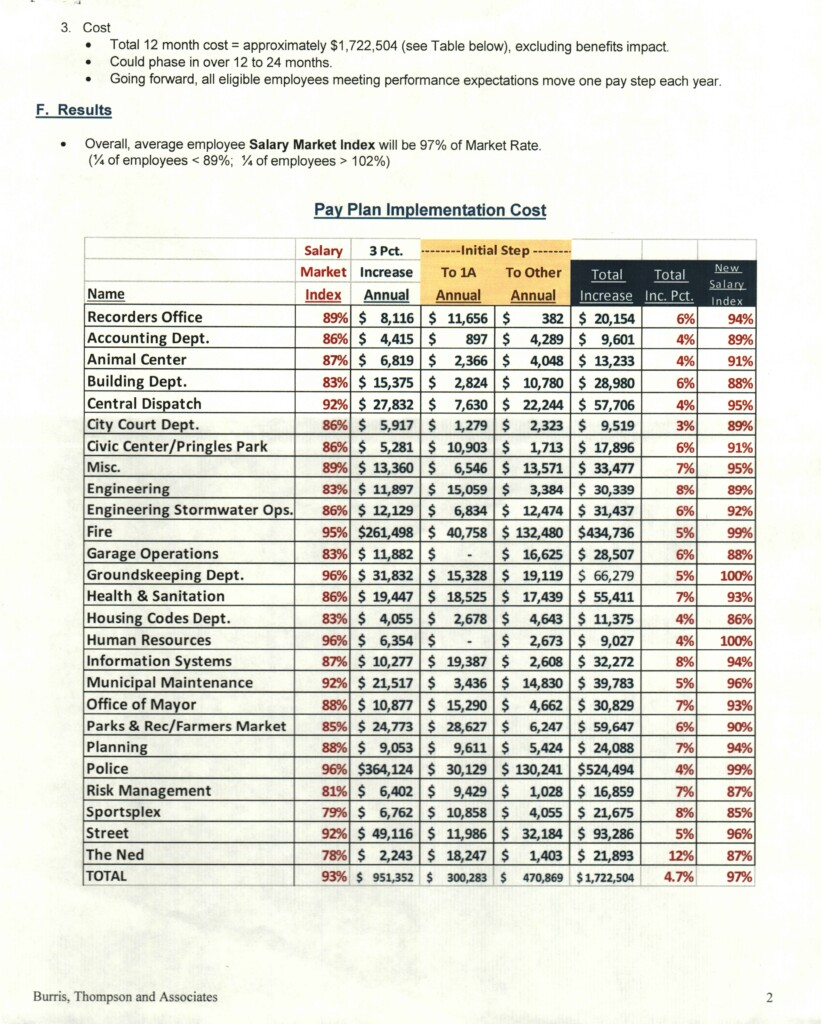
ORIGINAL STORY:
By RYAN HODGES
Study provides insight on potential salary increases for city employees
JACKSON, Tenn. — In our continuing coverage regarding the budget, we received additional documents to get a better understanding of the significant increases in city employees salaries.
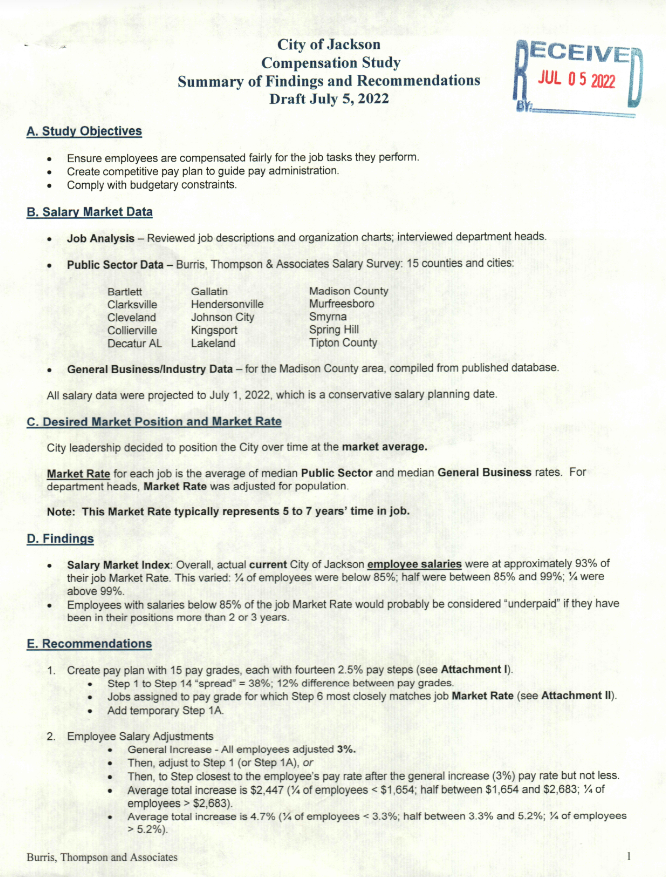
The biggest factor in the growth of the expenses in the City of Jackson’s proposed budget is salary and benefit increases for city employees. It has been mentioned multiple times in various city council meetings that these proposed increased are backed by a compensation study that was done in the summer of 2022.
On Friday morning, we were given this study. Here is what we found.
NONCOMPLIANCE WITH BUDGETARY CONSTRAINTS
At the very beginning of the study it lists three objectives. The first being that employees are compensated fairly, secondly, it should create a competitive pay plan, and finally, it should comply with budgetary constraints.
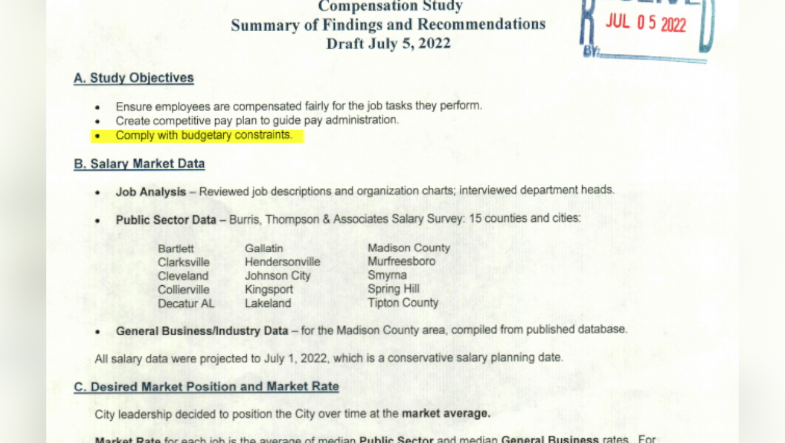
We asked Councilman J.P. Stovall if he thinks the city is currently meeting the third objective by complying with budgetary constraints.
“No. I do not think that it complies with the budgetary constraints because we’re operating on a deficit. So we don’t have a balanced budget.” Stovall responded.
Another question we had regarding this study had to do with the comparisons that were made.
According to tennessee-demographics.com, the city of Jackson has a population of around 68,000.
Some cities on the list like Gallatin, Collierville, and Bartlett, have a smaller population by a number anywhere from 12-18,000. Then you have Lakeland, they have a population of around 14,000 people. On the opposite end, Clarksville and Murfreesboro are on the list. They have around 100,000 more people than the city of Jackson.
PLANS TO MATCH SALARIES WITH MARKET VALUE
Finally, the reasoning behind the salary increases has been to try and get city employees paid comparable to their market value.
According to the study, it is not clear how the market value is set and what variance could be within the overall range of pay. Most of people currently working for the city were at approximately 93% of the so-called job market rate. A quarter of them below 85%. Half of them between 85% and 99%. And a quarter of them above 99%.
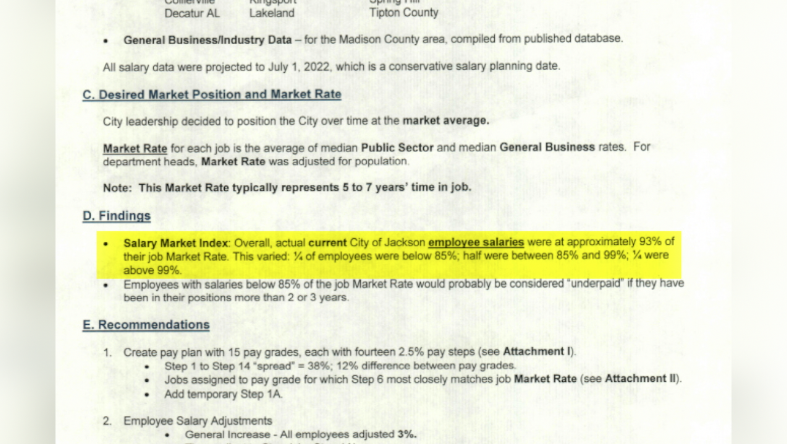
On the second page of the study, the recommended plan would move the average salary for employees to be 97% of the market rate. The cost of this excludes the impact it would have on current benefit costs.
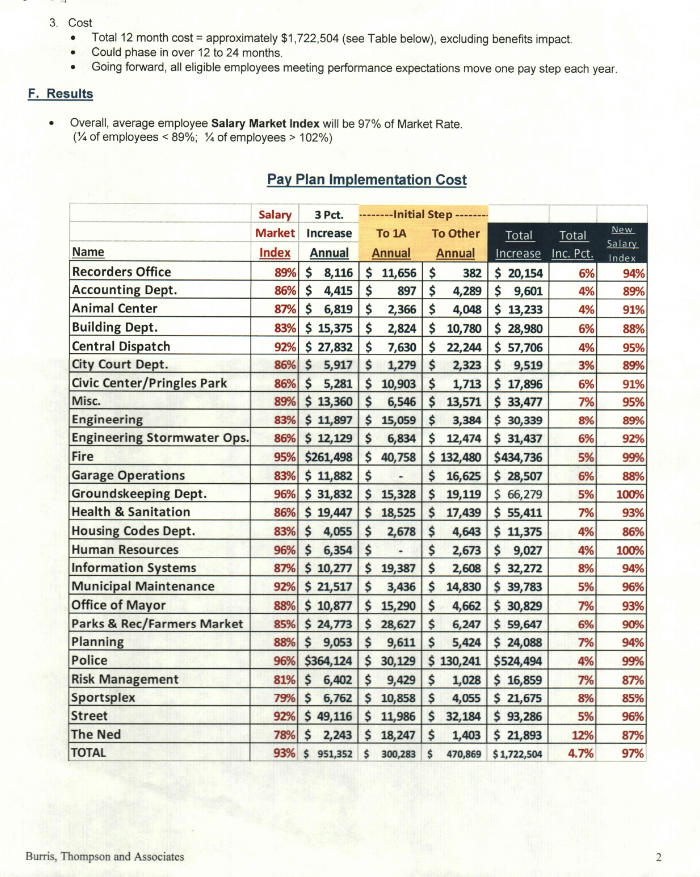
When asked, Stovall said he did not feel confident in the study’s accuracy.
“I don’t feel confident because I think what it is projecting is a perfect world in perfect settings and we’re just not in a shape right now to be able to do that,” said Stovall.
The study does indicate the changes could be accomplished over a 24 month period as opposed to only a 12 month period. The mayor is asking for the raises to be immediate and starting on July 1.

The city council will meet Tuesday, July 2, at 9 a.m. at the Jackson City Hall.
For more local news, click here.
